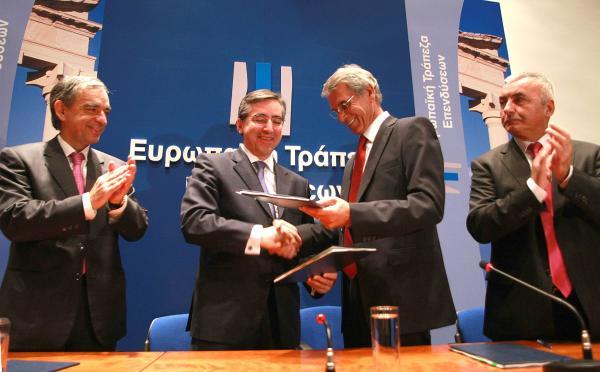
The European Investment Bank increased its total lending volume in 2009 to an unprecedented EUR 79 billion, a 37% rise from EUR 58 billion in 2008. This represents a new milestone in providing financial support for the European economy.
Last year, the EIB reinforced its focus on (i) small and medium-sized enterprises (SMEs), (ii) economically weaker regions across Europe (“convergence areas”) and (iii) the energy sector in the context of the fight against climate change.
Against this backdrop, the EIB signed today in Nicosia a EUR 50 million agreement with the Co-operative Central Bank Ltd. for financing SMEs in Cyprus.
The signing ceremony took place in the presence of Mr. Harilaos Stavrakis, Cypriot Minister of Finance. The agreement was signed on behalf of the EIB by Vice-President Plutarchos Sakellaris and for the Co-operative Central Bank by General Manager Mr. Erotokritos Chlorakiotis.
“In 2009 we had an unprecedented lending volume in terms of both our general activity and our financing in Cyprus. EIB lending in Cyprus in 2009 was double the average annual total over the last four years. It was also pioneering in opening up new lending possibilities. In addition to the importance of EIB lending to SMEs emphasised by the Cypriot Government, and especially Minister Stavrakis, in 2009 we launched an unprecedented cooperation with the three largest Cypriot banks in support of smaller-scale entrepreneurial activity in the country. I am pleased to make a further step in this direction, by signing today this new agreement with the Co-operative Central Bank. This will enable us to reach even more smaller businesses, which are the backbone of the Cypriot economy, and simultaneously the local financial system. We are at the service of Europe, and will continue to play a strong and active role in spurring economic recovery,” stated EIB Vice-President Plutarchos Sakellaris at the signing ceremony in Nicosia today.
In 2009, the EIB provided EUR 13 billion in credit lines to intermediary banks in the European Union for targeted lending to SMEs, an increase of 55% compared to the year before. Lending activities in the convergence areas amounted to EUR 29 billion (a 36% increase from EUR 21 billion in 2008) accounting for 37% of the Bank’s total lending volume. The lending was evenly balanced across the EU geographically, with the new Member States receiving EUR 13bn. The third priority - the fight against climate change - resulted in almost EUR 17 billion of loans for projects contributing to the reduction of the volume of CO2 emissions, including renewable energy (EUR 4.2 billion), energy efficiency (EUR 1.5 billion), R&D for cleaner transport (EUR 4.7 billion) and investments in urban transport (EUR 5.5 billion)
Stronger support to the real economy in Cyprus
In 2009 the EIB provided in Cyprus a total of EUR 202 million in Cyprus, mainly for SMEs and energy.
In 2009 the EIB joined forces with the major Cypriot banks - the Bank of Cyprus, Marfin Popular Bank and Hellenic Bank - to support the real economy and help counteract the impact of the crisis by easing SME funding during this difficult period. Through these operations, the EIB provided EUR 138 million to support SMEs and small and medium-scale infrastructure investments by private or public bodies, including local authorities, as well as beneficiaries of any size. This financing is available for projects in the fields of industry, tourism, services, the knowledge economy, energy and environmental protection in Cyprus.
EIB activity in Cyprus was also marked by the funding of Orites, the largest and most advanced wind farm in Cyprus. This paves the way for further developments in the sector and brings the Cypriot Government closer to its target and the EU’s objective for renewable energy production. The EIB provided EUR 64 million for the design, construction and operation of an 82 MW wind farm of 41 turbines which represents 27% of the planned installed wind energy capacity of 300MW by 2020. The EIB therefore readily to participated in a finance structure, taking on direct project risk and financing of the Orites project was one of the innovative transactions that prompted Euromoney to award the “Lender of the Year” title to the EIB.

Photographer: EIB ©To be defined
Download original